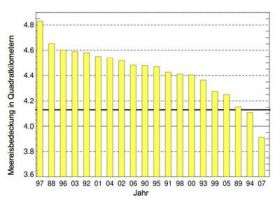How will the Arctic sea ice cover develop this summer?

The ice cover in the Arctic Ocean at the end of summer 2008 will lie, with almost 100 per cent probability, below that of the year 2005 – the year with the second lowest sea ice extent ever measured. Chances of an equally low value as in the extreme conditions of the year 2007 lie around eight per cent. Climate scientists from the Alfred Wegener Institute for Polar and Marine Research in the Helmholtz Association come to this conclusion in a recent model calculation.
They participate with their prognosis in an international scientific contest, in which some of the most renowned institutes on climate research want to fathom out possibilities for seasonal predictions on Arctic sea ice cover by means of different methods and climate models.
"After the strong decrease of the Arctic ice during the last summer, climate scientists all around the world are constantly asked: how will the ice develop in the next years?" describes Prof. Dr. Rüdiger Gerdes from the Alfred Wegener Institute his motivation. "To answer this question, we did not want to guess, but to rely on sound calculations."
The scientists' problem: scenarios of the long-term development of sea ice clearly indicate a de-creased ice cover - exact prognoses for the following summer, however, are not yet possible. This is mainly due to the fact that the short-term development of sea ice depends strongly on the actual atmospheric conditions, namely the weather and in particular wind, cloud cover and air temperatures.
Because the exact atmospheric conditions which determine the weather patterns in the Arctic Ocean during the coming months are not predictable, Rüdiger Gerdes and his team have entered atmospheric data of the last twenty years into an ocean sea ice model developed at the Alfred Wegener Institute.
"Through this, we are still not able", says Gerdes, "to make a definitive statement on sea ice cover in September. However, this 'trick' enables us to compute the bandwidth of possible ice covers, and to quantify the probability of extreme events." Apart from the variability of atmospheric quantities during the melting season, ice thickness at the beginning of the season determines the new ice minimum. Accordingly, computations of ice thickness enter the models of the researchers from Bremerhaven. Start conditions from June 27th 2008 were used for their current prognosis.
Different from long-term prognoses, the researchers' forecasts can quickly be checked by reality. This is all right by Rüdiger Gerdes and his team. "It is a first test, and all participating researchers are eager to know how their prognosis has fared at the end of the summer. In the end, this small competition serves the optimisation of our models, so that we are able to improve our predictions concerning short-term seasonal fluctuations. It has to be added, however, that even perfect models would not be able to rule out a component of chance regarding the atmosphere. These forecasts will always be about probability, and not exact prognoses."
Source: Helmholtz Association of German Research Centres





















